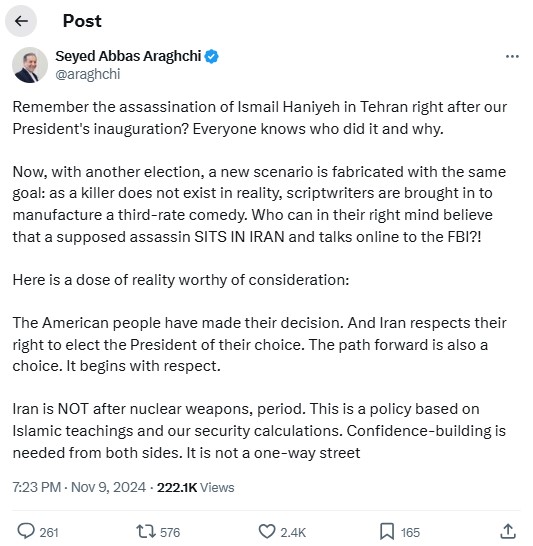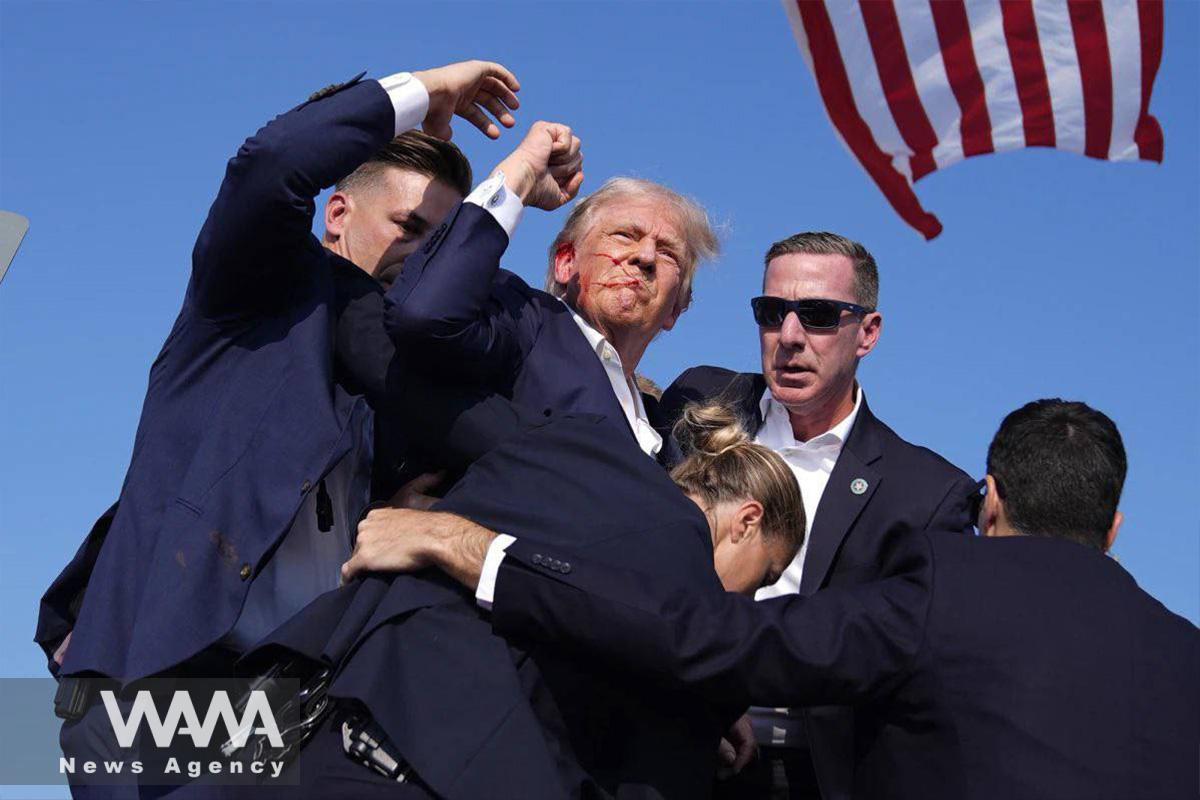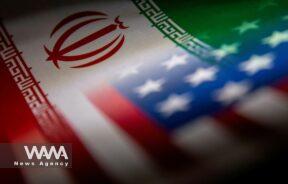Claim of an Attempted Assassination on Trump and Aggressive Policies Towards Iran
WANA (Nov 12) – Is the new American accusation against Iran simply another tactic to bolster its influence in the region, or is it part of a more complex scenario? This question occupies the minds of many political analysts and ordinary people today.
In the latest accusation, the U.S. Department of Justice claims that a man named Farhad Shakeri, an Afghan national, allegedly planned, with possible support from Iran, to assassinate former U.S. President Donald Trump. The FBI claims to have foiled this plot. However, Iran has categorically rejected these accusations. Esmail Baqai, spokesperson for Iran’s Foreign Ministry, called the claim a “conspiracy of Zionist circles.”
Abbas Araqchi, Iran’s Foreign Minister, posted on his personal account on the social network X (formerly Twitter):

“Now, with another election, a new scenario with a similar goal has been crafted: of course, since there is no actual killer, the scriptwriters have made it into a cheap comedy. Who in their right mind could believe that a supposed assassin is sitting in Iran and chatting online with the FBI?”
1. Creating a Fictional Enemy to Justify Militarism?
Over the decades, the U.S. has continuously sought to create foreign threats to justify its military presence in strategic regions like the Middle East. Noam Chomsky, a prominent political thinker, argues, “America always needs to see an enemy in front of it in order to advance its military and economic policies.”
In this context, portraying Iran as the “main regional threat” could justify continued military and financial support for Israel and Arab countries. According to CNN, in 2023 alone, the U.S. allocated over $3.8 billion in military aid to Israel.

Iranians React to Trump’s victory , Reformists’ Gamble Lost
WANA (Nov 06) – In 2016, the morning after the U.S. election, Iran’s reformist media were elated over what they believed was a guaranteed victory for Hillary Clinton. They even displayed her photo beside Iran’s then-president, the reformist Hassan Rouhani. But the election ended with Donald Trump’s unexpected win. Today, with Trump’s re-election, history […]
2. The Complex Game of Arms Sales: Profiting from Fear
Could the recent claims against Iran be part of a long-term U.S. plan to sell weapons to countries in the region? According to the Stockholm International Peace Research Institute (SIPRI), the U.S. sold over $110 billion in arms to Saudi Arabia and the UAE last year alone. By framing Iran as a “regional threat,” the U.S. can easily tell these nations: “We’ll protect you from Iran, but your security comes at a cost.”
John Mearsheimer, a professor at the University of Chicago, points out, “The U.S. has maintained its arms market in the Middle East by creating fear of foreign threats.”
3. Pushing Trump to Increase Pressure on Iran
Another possible goal of this accusation is to provoke Trump into escalating anti-Iranian actions if he returns to power. Richard Haass, President of the Council on Foreign Relations, argues, “With his hardline policies against Iran, especially the withdrawal from the nuclear deal, Trump has shown a willingness to confront.”
However, Araqchi continued his reaction, suggesting that these claims resemble a “political script” rather than a real threat: “Who in their right mind could believe that a supposed assassin is sitting in Iran and chatting online with the FBI?”

Iranians and the Failed Assassination of Donald Trump
WANA (July 15) – The failed assassination of Donald Trump, the former President of the United States, sparked widespread reactions across Iranian social media. Iranian users expressed their opinions using various hashtags. Many linked this incident to Trump’s assassination of General Qasem Soleimani, interpreting it as a form of divine retribution. For instance, one […]
4. Setting the Stage for Trump’s Assassination
A more complex scenario might be hidden within this accusation against Iran. Anti-Trump forces, by constructing such a case, might be seeking to harm him—a motivation that has only intensified since the election loss. Yet, if such an incident were to occur without prior groundwork, the blame would immediately fall on Trump’s political rivals.
For this reason, preparing public opinion and creating a pretext could help them shift the blame to a foreign enemy. While this idea has only been discussed theoretically and in political analyses, given the U.S.’s history of creating cases against Iran and other nations challenging its interests, such a scenario cannot be entirely ruled out.
5. Laying the Groundwork for a “Terrorist Scenario”?
The new allegations against Iran echo the approach taken by the U.S. after the September 11 attacks. Following those attacks, President George W. Bush launched new policies under the “War on Terror” banner, which led to military interventions in Afghanistan and Iraq. Michael Chossudovsky, a professor at the University of Ottawa, writes, “Events like 9/11 provided an excuse for the U.S. to expand its military policies in the Middle East.”

6. Using Islamophobia to Control Domestic Audiences
Anti-Iranian accusations extend beyond the Middle East. After September 11, the United States passed the Patriot Act, implementing extensive monitoring of domestic and international communications. Edward Snowden, the well-known whistleblower, wrote in his book, “The Patriot Act was merely an excuse for widespread surveillance of the people; something that continues to this day.”
Similarly, framing a foreign enemy like Iran could justify increased domestic surveillance and a heightened security atmosphere within the United States.
Given all this evidence, is the U.S. once again using a fictional enemy to achieve its strategic goals in the Middle East, or is there truth to these claims?













